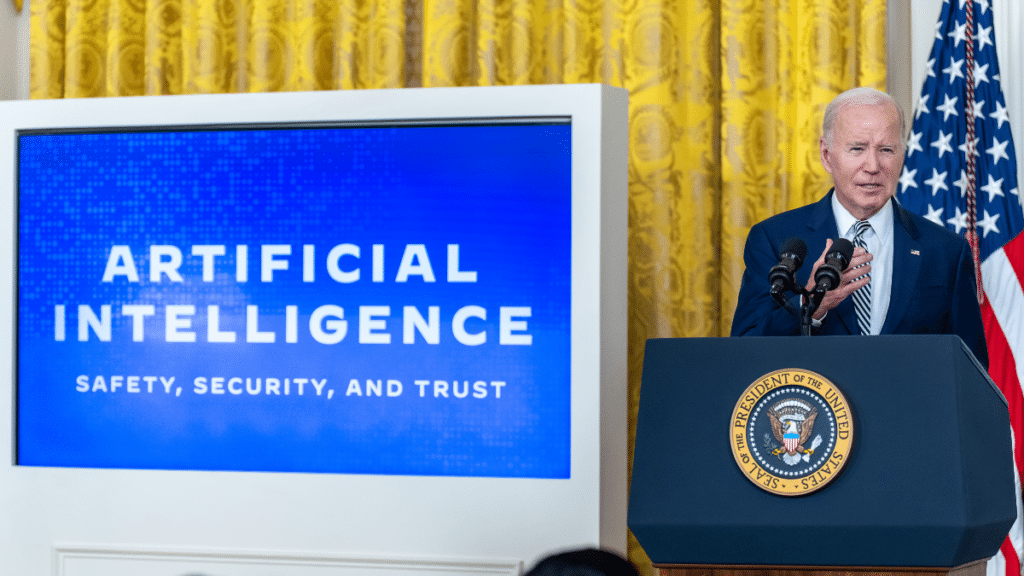2023 US Tech Policy Year in Review: Five Issues that Shaped the Year
Alexander Hart, Rachel Lau, Kennedy Patlan / Dec 21, 2023Alexander C. Hart, Rachel Lau, and Kennedy Patlan work with leading public interest foundations and nonprofits on technology policy issues at Freedman Consulting, LLC.

US President Joe Biden announces an executive order on artificial intelligence, October 30, 2023.
2023 saw significant developments across US tech policy issues, including in AI, children’s privacy, and national security. Tech policy this year also rose to prominence at every level of government as the White House, federal agencies, and state governments took action.
In this year-in-review, we delve into five pivotal issues that left a mark on the tech policy landscape in 2023. Read on to learn more.
1. AI Dominated Conversations
AI was the number one hot topic of tech policy in 2023 as policymakers and leaders around the world increased their focus on AI issues following the release of ChatGPT in late November 2022. From addressing existential risk and deepfakes to AI’s impact on healthcare and education, a wide range of AI-related bills and policies have been introduced and explored this year, although few AI-focused bills have passed. Various federal agencies solicited public opinions and began processes for creating AI regulations and policy throughout the year, including the Office of Science and Technology Policy, National Telecommunications and Information Administration (NTIA), the Consumer Financial Protection Bureau, and the National Science Foundation. The House of Representatives and Senate also held many hearings on AI and AI-related topics in 2023 with attendees from civil society, academia, and industry. Some of the key 2023 AI highlights include:
- In January, National Institute of Standards and Technology (NIST) released its AI Risk Management Framework identifying methods for mitigating AI risks.
- President Biden issued an Executive Order on Advancing Racial Equity and Support for Underserved Communities Through the Federal Government in February, instructing agencies to "root out bias in the design and use of new technologies.”
- NTIA launched a request for comment on mechanisms to protect Americans from potential harms in April.
- The White House announced a strategic roadmap for federal investments in research and development in May.
- In June, Senate Majority Leader Chuck Schumer (D-NY) began his campaign to lead on AI policy by releasing the SAFE Innovation Framework and announcing a series of AI Insight Forums. Schumer’s AI forums started in September and continued through December, featuring industry, academic, and civil society representatives.
- Leading AI companies voluntarily pledged in June to take action towards improving the safety, security, and transparency of AI technology.
- In August, the Federal Election Commission (FEC) unanimously moved forward a petition submitted by Public Citizen calling on the FEC to regulate the use of deepfakes in political ads, opening the door to additional investigations into the topic.
- In October, the Biden administration released its highly anticipated executive order and accompanying fact sheet on “safe, secure, and trustworthy artificial intelligence.”
- Following the executive order announcement, the Office of Management and Budget (OMB) started November by releasing draft guidance on AI governance in federal agencies.
- In December, the National Defense Authorization Act included several AI provisions, including creating “a prize competition for detecting and watermarking AI-generated content.”
2. Children’s Safety Online Saw Much Debate; National Progress Was Limited
The year began with President Biden uplifting the importance of children’s safety online at the 2023 State of the Union. The White House continued centering children’s safety in May, when the administration shared agency-led plans to “safeguard children’s privacy, health, and safety from online harms.” Also at the federal level, the FTC reached a key settlement with Microsoft after the company’s Xbox gaming system was found to have violated children’s privacy protections.
At the state level, Illinois became the first state to pass legislation to protect child influencers. Meanwhile, states including California and Utah passed legislation, while others made advancements in developing child-focused privacy laws of their own. On the enforcement front, 33 state attorneys general filed a landmark lawsuit against Meta alleging the company promoted harmful features that knowingly addicted children and teens on their Instagram and Facebook platforms. (Nine other attorneys general filed similar, independent complaints.)
In Congress, policymakers made limited progress toward getting federal legislation passed. In December 2023, the Senate Judiciary Committee reported the Kids Online Safety Act (S.1409, sponsored by Sen. Richard Blumenthal (D-CT)), also known as KOSA. That same month, the Senate Commerce Committee reported the Children and Teens’ Online Privacy Protection Act (S.1418, sponsored by Sen. Ed Markey (D-MA) and Sen. Bill Cassidy (R-LA)), also known as COPPA 2.0. Earlier this year, the Senate Commerce Committee also reported the EARN IT Act of 2023 (S.1207, sponsored by Sen. Lindsay Graham (R-SC)). While none of these bills saw floor consideration in 2023, there may be a window of opportunity for bills to pass the Senate in 2024.
Next year, advocates will also be monitoring what happens with other children’s safety/privacy legislation introduced in 2023, including:
- Clean Slate for Kids Online Act of 2023 (S.395, sponsored by Sen. Dick Durbin (D-IL)) – introduced in February
- STOP CSAM Act of 2023 (S.1199, sponsored by Sen. Dick Durbin (D-IL)) – unanimously advanced by Senate Judiciary Committee in May
- Protecting Kids on Social Media Act (S.1291, sponsored by Sen. Brian Schatz, (D-HI)) – introduced in April
- Protecting Young Minds Online Act (H.R.3164, sponsored by Rep. Bryan Steil (R-WI)) – introduced in May
- Child Online Safety Modernization Act (H.R.5182, sponsored by Rep. Ann Wagner (R-MO)) – introduced in August
3. Stakeholders Debated Surveillance Reform Approaches
Throughout the year, civil society, lawmakers, and national intelligence communities discussed the future of Section 702, a provision in the Foreign Intelligence Surveillance Act (FISA) Amendments Act of 2008. The provision allows the US government to “collect, analyze, and appropriately share foreign intelligence information about national security threats” connected to non-Americans located abroad. With Section 702 set to expire in December 2023, supporters and opponents grappled with the provisions' uses and abuses ahead of its potential renewal.
As the year came to a close, competing proposals for reform emerged from Congress, including the bipartisan Government Surveillance Reform Act (S.3234/H.R.6262, originally sponsored by Sens. Ron Wyden (D-OR) and Mike Lee (R-UT); Reps. Warren Davidson (R-OH) and Zoe Lofgren (D-CA)); the Protect Liberty and End Warrantless Surveillance Act of 2023 (H.R. 6570, sponsored by Rep. Andy Biggs (R-AZ)); and the FISA Reform and Reauthorization Act of 2023 (S.3351/H.R. 6611, sponsored by Sens. Mark Warner (D-VA) and Marco Rubio (R-FL); Rep. Mike Turner (R-OH)). The first two bills created warrant requirements for use of 702 data involving Americans (among other reforms), while the FISA Reform and Reauthorization Act had significantly more limited protections.
While House Speaker Mike Johnson (R-LA) initially indicated the House would hold floor votes on reform proposals; he later backpedaled in the face of divisions among Republicans. Instead, Congress approved a four-month extension of Section 702 through the passage of the 2023 National Defense Authorization Act in December. With Section 702 now set to expire in April 2024, this latest move from Congress means that Section 702 reform conversations will likely continue next year.
4. Governments Grappled with TikTok
TikTok found itself in hot water this year over data privacy and national security concerns due to parent company ByteDance’s ties to China. In March, the Biden administration ordered ByteDance to divest TikTok, threatening to ban the app if it did not do so. TikTok’s CEO Shou Chew testified before the U.S. House Committee on Energy and Commerce in March amidst a wave of anti-TikTok bills in Congress.
Federal agencies began implementing a ban on TikTok on federal government devices, but bills like the RESTRICT Act (S.686, sponsored by Sen. Mark Warner, D-VA), which would allow the Department of Commerce to discover and block technology deals and products relating to China and five other “foreign adversary countries,” failed to gain traction despite initial momentum.
A number of states also banned the app on government devices. Montana became the first state to pass legislation to ban TikTok outright in May, although the ban was then blocked by a judge in November. Texas’s ban on TikTok on state government devices was upheld by a judge in December despite First Amendment challenges.
5. Agencies Pursued Major Competition Enforcement Efforts
This year, agencies opened and continued major cases against large social media companies related to competition.
The Department of Justice took on Google in a historic trial. The suit alleges that Google aimed to suppress competition from other search engine providers. After concluding the evidentiary phase in November, the U.S. District Court for DC will hold closing arguments in May 2024. At the end of the year, Google also lost a separate monopoly case , filed by Epic Games. In a third case against the company filed by state attorneys, Google’s Android app store was found to be in violation of antitrust laws, and the company was fined $700 million, to be distributed to US states and consumers.
2023 was also a big year for the Federal Trade Commission’s work on technology. In February, the agency launched the new Office of Technology to help the FTC “keep pace” with technology developments. This year, FTC Chair Lina Khan also stressed the agency’s increasing focus on AI, particularly in investigating the technology’s effects on consumers and marketplaces. This new focus was clear in July, when the FTC launched an investigation into OpenAI. Throughout the year, the agency was also highly active in launching anti-competition investigations and court cases against major tech companies, including X (formerly known as Twitter) and Amazon. This summer, the FTC took on Microsoft in an effort to stop the company’s acquisition of Activision Blizzard. The agency’s initial injunction was blocked, but in December 2023, the FTC began the process to appeal the decision.
Finally, in December, the FTC and DOJ released their finalized 2023 merger guidelines, following a two-year engagement period. The updated guidelines reflect modern day market dynamics, including the rise of platform markets. As a result, the guidelines offer a contemporary, stronger antitrust enforcement framework, particularly against acts of corporate consolidation and merger activities.
---
In sum, 2023 was a big year for technology policy, and 2024 already is shaping up to be tremendously consequential. The Freedman Consulting team will continue its efforts to track and analyze major developments in US tech policy – please contact Alex Hart with any feedback about this article or thoughts on how our work can be most useful in the year ahead.
Authors


